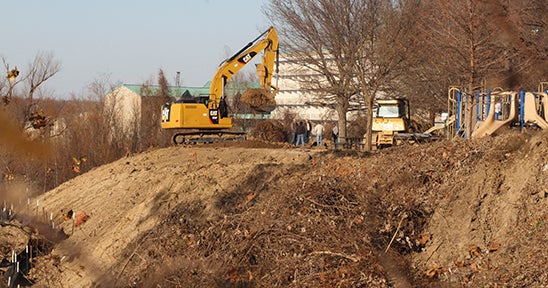Land records being researched to find source of park contamination
Published 7:34 pm Friday, January 12, 2018

- Repairs are seen taking place at Riverfront Park to fix a slide area and play areas Thursday, Jan. 4. Repairs were halted Friday when workers excavated oil that is believed to be from an oil tank farm that was once in the area.(Courtland Wells/The Vicksburg Post)
Officials with the Mississippi Department of Environmental Quality are researching county land records to determine the source of oil contamination at Riverfront Park, and who may be responsible for it.
Central Asphalt Co. of Vicksburg was awarded a contract to repair a slide area in the southern part of the park.
While its employees were working in the area Jan. 4, a track hoe dug up a scoop of oil believed to have been left from a former tank farm. The discovery shut down work at the park, which has been closed since Dec. 3, when the work began.
Board of Supervisors President Richard George said the city and county bought the property where the leak was discovered in the early 1990s. He said there were no problems with any foreign liquids when the park was built.
Lynn Chambers, division chief for DEQ’s groundwater assessment and remediation division, said at one time Midsouth Oil had a storage facility with nine above ground storage tanks that held various petroleum products on property south of the park.
The tank farm, she said, was located in an area between Ameristar and the park, and within 10 feet of the park’s access road off Washington Street. The former tank farm site is now part of the casino’s north parking area.
“An assessment was done when the tanks were being removed during the construction of Ameristar, and we do have a small area under a restrictive use agreed order because there was limited petroleum contamination in that area (of the parking lot),” she said.
Chambers said the restricted use agreement prohibits any digging in the parking lot area without the approval of environmental agencies.
“There is a small portion on that tank farm area; it’s actually going to be under the parking lot,” she said. “There was some soil contamination that was left in place. It does not pose a treat as long as nobody goes digging in the parking lot of the Ameristar.”
Chambers said the city’s environmental consultant is working with MDEQ to research land deeds on the property to see what may have been on what is now the south end of the park before it was purchased.
“Before we go out there and do any excavation work, we’re tying to determine the extent of the contamination because that impacts the way we handle the excavation activities,” she said. “If we know what the source is before we start digging, we can have a better approach to make sure we minimize our impact to the area, but we remove everything that is contaminated.”
A section of the bluff on the south end of the park began slowly sliding off the bank in April 2015, taking part of the park’s perimeter fence and walking trail, and threatening one play area, part of which sits on the slide.
To fix the slide, the contractor will have to excavate topsoil along the top bank of the river — a project that will require removing some playground equipment to provide enough room to make the repairs, which involves dirt work and rehabilitating underground drain pipes that were part of the cause of the slide.






